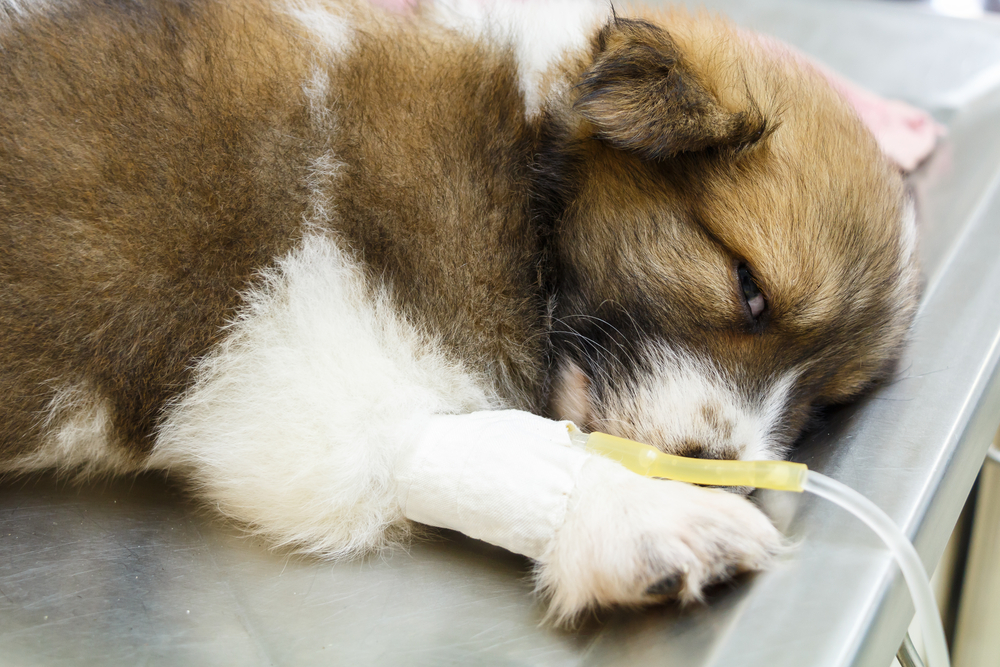Parvovirus—the name of this disease strikes fear in the heart of dog owners, especially puppy owners.
Parvovirus is a serious, sometimes fatal, condition that routinely infects puppies who have not completed their vaccination series, although older dogs can also be affected. By knowing how this disease is transmitted and its effects on your dog, you can better protect your furry pal from this highly infectious illness.
What is parvovirus in dogs?
Canine parvovirus is a highly contagious disease that attacks the gastrointestinal (GI) tract, and is a relatively common cause of acute GI illness in young or unvaccinated dogs. The disease is believed to have originated from the feline panleukopenia virus, a similar illness in cats. In addition to being highly infectious, the virus is incredibly hardy, and can survive at room temperature inside homes for up to two months, and in the soil outdoors for years.
Is it easy for my dog to contract parvovirus?
If your dog is fully vaccinated and boostered appropriately and regularly for parvovirus, their chance of contracting parvo is almost zero. However, unvaccinated dogs can easily contract a parvo infection. The virus particles are shed in infected dogs’ feces four to five days after exposure, often before signs develop, throughout the illness period, and for about 10 days after clinical recovery. Dogs can be infected by direct oral or nasal contact with the virus-containing feces. Indirect transmission can also occur when a dog comes in contact with a contaminated fomite, such as bedding, food bowls, or clothing.
What should I watch for if I think my dog has parvovirus?
Once dogs are infected, parvovirus signs generally develop in five to seven days, although signs can appear as early as two days post-infection, or as late as 14 days. The first signs may be vague and non-specific, such as lethargy, anorexia, and fever, but the infection can progress quickly to vomiting and bloody diarrhea in 24 to 48 hours.
Although puppies routinely chew things that make them vomit, you should seek veterinary treatment at the first sign of illness in your furry pal. Early treatment offers the best prognosis for a pet with parvo.
How can I best protect my dog from parvovirus?

Dog owners can protect their canine companions from this potentially fatal illness by following these steps:
- Vaccinate on schedule — Nothing protects your dog more from contracting parvo than an appropriate vaccination series. Puppies should receive their first vaccine at 7–8 weeks old, and receive boosters every three weeks until 16–17 weeks, while adult dogs should be boostered annually or once every three years. If you forget to schedule your pet’s vaccination appointment and they fall behind, they may need to be boostered three to four weeks after their initial vaccine, so be on the lookout for vaccine reminders from Westerville Veterinary Clinic.
- Practice good hygiene — The parvo pathogen is easily transmitted through direct and indirect contact, so practicing good hygiene is essential to remove traces of infective feces that can infect your pet. After interacting with other dogs, wash your hands thoroughly before coming home to your own dog, and clean your shoes if necessary.
- Avoid areas with unvaccinated dogs — While pet stores seem great places to socialize your new puppy, they have no vaccination requirements to enter, which means unvaccinated dogs can easily transmit parvo to your pet. Wait to let your puppy roam the aisles of your local pet store until they’ve had their entire vaccination series, and keep them off the ground until they’re about 4 months of age. Dog parks are particularly dangerous, since there is the potential for infected dogs to easily pass the virus to other visitors.
- Pick up after your pet — Picking up after your pet won’t necessarily protect your puppy from parvo, but it’s the right thing to do, and will serve as a good example to other dog owners. By leaving waste on the ground, intestinal parasites and infectious diseases can linger in the environment for months or years, waiting to infect an unsuspecting dog.
Your Westerville Veterinary Clinic team is here to keep your furry pal healthy and happy, and there’s no better way than through regular preventive care, such as vaccinations. If your pup is due for a parvovirus vaccination, or any other wellness care, contact our team for an appointment.







Leave A Comment